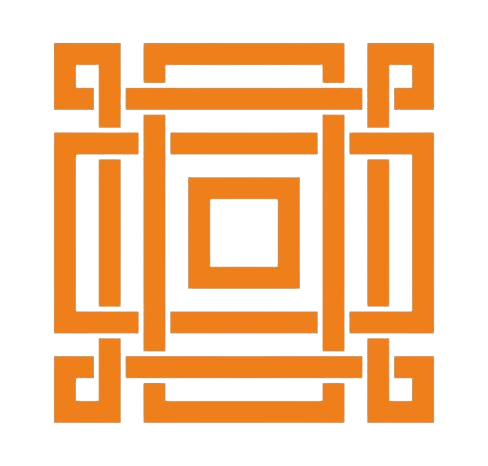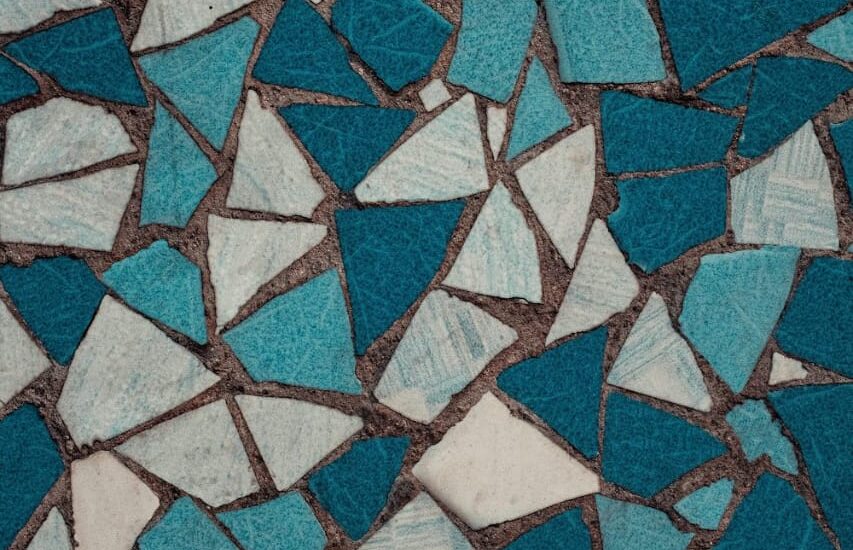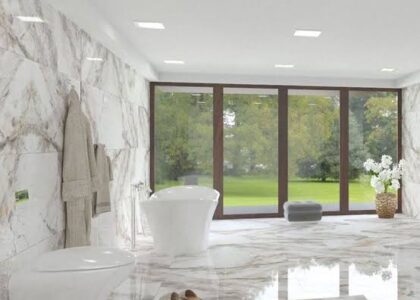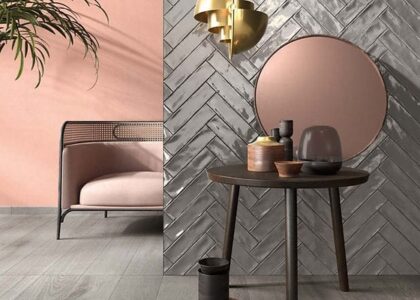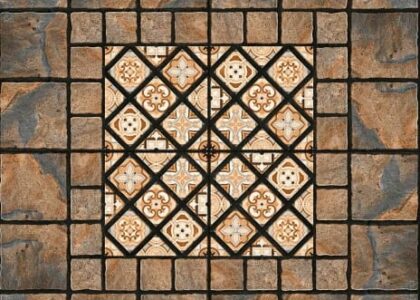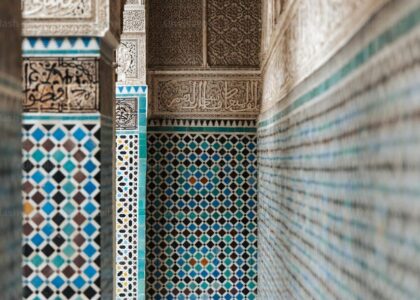History of product :
4th century BC: Egyptians used blue tiles and bricks to decorate their homes. 5th century BC: The Ishtar Door of Babylon was constructed, featuring glazed bricks decorated with dragons, bulls, and lions. 3rd millennium BC: Mesopotamian temples were decorated with early forms of mosaics. 13th and 14th centuries: Tiles were used to line church walkways. 2nd millennium BC: Glazing was introduced. Islamic period: Decorative ceramic tiles became widespread as decorations both outside and inside buildings. Middle Ages: Decorative tiles became popular. 17th and 18th centuries: The Netherlands became an important center for the production of decorative tiles. The first tiles were made from various combinations of clay, rocks, sand, and other local materials. These ancient materials have survived thousands of years, proving the durability of even the most simple tile compositions.
Future of this product :
Ceramic Tile Market size was USD 341.53 billion in 2021 and projected to grow from USD 391.2 billion in 2023 to USD 728.5 billion by 2032, exhibiting a CAGR of 7.1% during the forecast period. The ceramic tiles have emerged as a versatile and stylish choice, transforming spaces into aesthetic masterpiece.
Benefits of this product :
Durability: Ceramic tiles are resistant to chemicals, moisture, stains, and bacteria. Hygiene: Ceramic tiles are hypoallergenic, non-porous, and don’t promote mold, mildew, or other allergens. Easy to clean: Ceramic tiles are waterproof, non-absorbent, and easy to disinfect. Temperature control: Ceramic tiles can feel cool, making them a good choice for hot rooms. Traction: Matte or textured tiles provide traction, making them safe for wet feet. Variety of colors and designs: Ceramic tiles come in many colors and designs.
What :
Ceramic tiles are thin slabs of clay, silica, dyes, and other raw materials that are shaped and fired in a kiln to create a hard, durable surface finish. They are used for floor and walls in bathrooms, kitchens, and other areas of the home. Ceramic tiles are available in a variety of colors, sizes, and designs, including natural stone looks. Ceramic tiles are waterproof, non-absorbent, and easy to clean. They come in two forms—glazed and unglazed, with the majority being glazed to create an impervious seal over the natural clay material surface. Glazed tiles have a protective finish that can be matte or glossy, with matte finishes recommended for most applications, while glossy finished are recommended for walls. Ceramic tiles are rated for scratch hardness according to the Mohs scale, which measures the ability of ceramic tiles to withstand scratches from a variety of minerals, ranging from the softest (talc) to the hardest (diamond). Ceramic tiles that are designed for residential use typically have a rating of 5, while those designed for industrial or heavy traffic areas have a rating of 7 or higher. Ceramic tiles are popular with home owners for their durability, timeless aesthetic, and relative affordability. On average, ceramic tile cost between 60-70% less than porcelain tile.
Where :
Ceramic tiles are commonly used in homes for walls, floors, countertops, and back splashes. They are often used in kitchens, laundry room, bathroom, and swimming pools. Ceramic tiles are easy to clean and maintain, and they are resistant to moisture, stains, bacteria, and odors. They also feel cool, making them a good choice for flooring in rooms that get.
How :
Ceramic tiles are made from a mixture of clay, minerals, and water, which is the shape, dried, and fired in a kiln at high temperatures. These tiles can be glazed or unglazed, with glazed tiles having a hard, non-porous surface that is stain-resistant and easy to clean.
How product is made :
Ceramic tiles are made from a mixture of clay, minerals, and water, which is the shape, dried, and fired in a kiln at high temperatures. These tiles can be glazed or unglazed, with glazed tiles having a hard, non-porous surface that is stain-resistant and easy to clean.
Raw material of this product :
Common materials used to produce ceramic tiles include white clay, talc, sand, feldspar, illitic and kaolinitic clay, dolomite and calcite. The manufacturer will quarry and define them. Also, they will bring the materials to the manufacturing plant and store them separately.
QC test :
A high-quality tile will have a clean, sharp edge, while a lower quality tile may have rough or uneven edges. Test the quality of the glaze : Scratch the surface with a sharp object to test the quality of the glaze. A good quality tile will not show any signs of damage or scratching.
Packaging :
To ship tiles, start by securely wrapping each tile in bubble wrap. Place them in a sturdy box and use packing peanuts or crumpled paper to fill any gaps. Seal the box with packing tape and label it “fragile.” Finally, consider using a reputable shipping carrier that offers insurance for aided protection.
Global market :
The global ceramic tiles market size was estimated at USD 186.70 billion in 2023 and is projected to grow at a compound annual growth rate (CAGR) of 7.4% from 2024 to 2030.
Indian product market :
Ceramic Tiles today have become an integral part of home improvement. It can make a huge difference to the way your interiors and outdoors look and express. The Indian tile industry, despite an overall slowdown of the economy continues to grow at a healthy 15% per annum. Investments in the last 5 years have aggregated over Rs. 5000 crores. The overall size of the Indian ceramic tile industry is approximately Rs 18,000 crore (FY12). The production during 2011-12 stood at approx. 600 million square meters. The Indian tile industry is divided into organized and unorganized sector. The organized sector comprises of approximately 14 players. The current size of the organized sector is about Rs 7,200 Crores. The unorganized sector accounts for nearly 60% of the total industry bearing testimony of the growth potential of this sector. India ranks in the top 3 list of countries in terms of tile production in the world. With proper planning and better quality control our exports (presently in significant) contribution can significantly increased.
Other :
“The world has no shortage of tile companies but not every venture is ordained for success. While some companies have risen from a humble launch to a stock present and has been through its fair share of struggle, some have already been preparing itself for prominence. The companies that have researched and developed their own methodology and functional process have attained consistent feats over the years. Below we have mentioned top 10 companies of tiles that have made a name for themselves not just in their nation of origin but also on a global stage. These companies have not just had the profits chunks to bite on but have time and again proven that their trade and manufacturing practices are in line with the environmental sustainability, employees contentment, and customer satisfaction. Top 10 Tiles Company in World – 2021
10. Grupo Fragnani, Brazil
09. STN, Spain 08. Kajaria Ceramics, India 07. PAMESA, Spain 06. Caramelo For, Brazil 05. Grupo DAS, Brazil 04. RAK Ceramics PJSC, UAE 03. Grupo Lamosa, Mexico 02. SCG Ceramics, Thailand 01. Mohawk Industries, Inc., USA 10. Grupo Fragnani, Brazil This South American giant has been in the tiles industry for half a century, estimated production of ceramic tiles which swanks to be 8th largest in the world; Grupo Fragnani is one of the foremost companies in Brazil. With its headquarter company – Infra located in Cordero Polis, the Group Fragnani also has two other companies in Dias d’Avila: Tecnogres & Incensor. From its inception in 1971 by Valdemar Fragnani, Fragnani Group has always been considered one of the most reputable brands known for its suitability, enhanced artistic value and durability. Manufacturing a wide varieties of ceramic tiles, porcelain tiles, HD tiles, 3D tiles etc. the product line of Grupo Fragnani includes the following brands: – In Out Porcelanato – Technologies Porcelanato – Incenor – Infra 09. STN Ceramic, Spain For over three decades STN Ceramica has had a strong hold in the European Market. With its outright and strengthened reach to 120 countries this 9001 ISO Standard certified brand has been able to stamp its mark over Spain and most of Europe because of its constant ventures in technologically enhanced and ethically accountable products. Subsequently, STN Ceramics manufacturing line has been fortified by its renewal process techniques and the one digital printing technology Stylet. The technological breakthrough have allowed the STN Ceramica to come out with exceptional high shine finishes and heavy duty tiles. Offering a wide range of sizes in a variety of patterns and texture, STN Ceramica presents an array of products including – Porcelain Tiles – Marble Tiles – Red Stoneware Tiles – Glazed Tiles – White Body Tiles – Color Body Tiles 08. Kajaria Ceramics, India From the 2nd largest consumer of Tiles: India, comes its largest manufacturer in ceramics – Kajaria Ceramics with an authoritative Global presence. Since its foundation laid in the 1980s, Kajaria Ceramics has persistently surpassed its preceding results. Currently, a manufacturing capacity of in excess of 70 million square meters, Kajaria Ceramics has a reach to more than 30 countries in five major continents. Strengthening its brand value is the accolade of being the “Asia’s Most Promising Brand”, and owing to its research and application it has been able to deliver creatively innovation and exclusive products. Possessing nearly 3000 selection of ceramic tiles the range of Kajaria Ceramics serves every corners of the construction and comprises of: – Glazed Vitrified Tiles – Ceramic Tiles – Polished Vitrified Tiles 07. PAMESA CERAMICA, Spa In Another proud Spanish company ruling the charts for nearly five decades is the Pamesa Ceramica, this parent Company of the Pamesa Group has for all time committed itself to serve its customers need with its innovation, environmental sustainable practices and parity culture to encourage equal opportunity in their work structure. An annual turnover of over 5 billion Euros and a production capacity of approximately 80 million square meters. Cataloging an array of ceramic options, Pamesa Ceramica offers solutions for every space, size, mood & effect. Its product line includes – Porcelain Tiles – Marble Tiles – Ceramic Tiles – Porcelain Stoneware Tiles 06. Cerâmica Carmelo Fior Ltda, Brazil The late 1980s saw the establishment of this family owned venture and over its long history in Ceramic tiles market, Ceramica Carmelo For Ltda has risen in ranks to compete with the best in the world. With 4 factories and a total production capacity of 7,000,000 sq. mtrs every month this Brazilian entity owns 6 brands name Xcafe, Fiorano, Ideal, Ariell, Vinilforte & Pisoforte. With its exports to over 50 countries, Carmelo For has certainly been one of the most recognized name in the ceramic tiles industry. The production line produces the following selection in: – Ceramic Tiles – Porcelain Tiles – Vitrified Tiles – Natural Stoneware Tiles – Porcelain Tiles – HD Tiles 05. Grupo Cadasa, Brazil Grupo Cadasa is another contributor in the top 10 tiles company in the world. It was established in 1990 by the Passion family. Within 10 years, the Casa Group was able to reach new heights with recognition of being the largest and most modern tile industry in Latin America. Today, it finds its way amidst the top companies in the global arena. With a monthly production of 5.5 million square meters, the Casa Group comprises of Casa, Major, Vista Bella & Lorenza brands. Offers a variety of size finish and textures, the tiles produced by the Casa Group are also identified for functional usage. Its products on offer are – Porcelain Tiles – Premium Line Tiles – Ceramic Tiles – Natural Marble Tiles 04. RAK Ceramics PJSC, UAE In 1989, when H.H. Sheikh Saud Bin Saqr Al Qasimi, Ruler of Ras Al Khaimah founded RAK Ceramics PJSC, its state-of-the-art machinery and the vision and mission to make a Global impact was straight away a contender in the global scene. In three decades, the company has gained the capacity to manufacture over 120 million square meters of tiles and 5 million pieces of sanitary ware every year. It has been recognized as one of the top tile companies in the world. Owing to an aggressive expansion tactics, RAK Ceramics has now 22 plants in India and Bangladesh. It was the first company in UAE to be awarded with ISO 9000 certification by CICS, UK. An extensive line of offering with multitudes of options, starting from glossy & high glossy to matte finishes. It offers: – Glazed Porcelain Tiles – Ceramic Tiles – Glazed Porcelain Vitrified Tiles 03. Grupo Lamosa, Mexico Legacy of more than 130 Years to its name, Grupo Lamosa is one of the oldest and recognizable names in the tiles industry. As tiles were added to its original production of bricks around 1933, and since then there is no looking back for this Mexican Giant. Since 2016, the company through its acquisitions in South America has amplified its already enormous production capacity by 40% by acquiring plants in Argentina, Colombia, Peru and Chile. With most of its production consumed in the country itself, 20% of it is exported to Central & South America including the United States. Group Lamosa manufactures and delivers: – Porcelain Tiles – Ceramic Tiles – Wall & Floor Tiles – Adhesives – Grouts – Waterproofing Solutions 02. SCG Ceramics, Thailand This top tier ceramic tile company which was originally five different companies including The-German Ceramic Industry Public Ltd., The Sims Ceramic Group Industries Company Ltd., Sosuco & Group Co. Ltd., Thai Ceramic Co.Ltd. & Gemango Co. Ltd. where amalgamated into SCG Ceramics. With a production capacity of 94 million square meters per year, SCG Ceramics lead the Thai market share by 58%. SCG Ceramics mainly exports to South East Asia, Australia & Japan and generates in excess of 2 billion baht per year. Developing its courses to compliment the changing needs of the customers, SCG Ceramics provides a wide range of services not limited just to manufacturing but also extended to installation and distribution of ceramic floor & wall tiles. SCG Ceramics serves its products under the brands of – COTTON – CAMPANA – SODUCO 01. Mohawk Industries, Inc., USA Stalwart Mohawk Industries, Inc. take number one spot for top 10 tiles companies in the world. With an output capacity of more than 250 million square meters of tiles every year and an insistent expansion strategies spanning to Europe, Mohawk Industries boost a worldwide sales of over 10 billion dollars in 2020 itself. With just under 3 decades of existence the persistence of the Mohawk Industries with soft surface acquisitions at the start of the new century skyrocketed the sales and the reputation of the company. With its ever-growing requirements in Europe, Asia, South America and Oceania the Mohawk Industries, Inc. have certainly taken over the world or most of it. The Company produces following products – Ceramic Tiles – Residential Carpet – Commercial Carpet – Area Rugs, Bath Drugs & Maths – Laminate Flooring – Luxury Vinyl Tile – Sheet Vinyl – Wood Flooring – Countertops”

